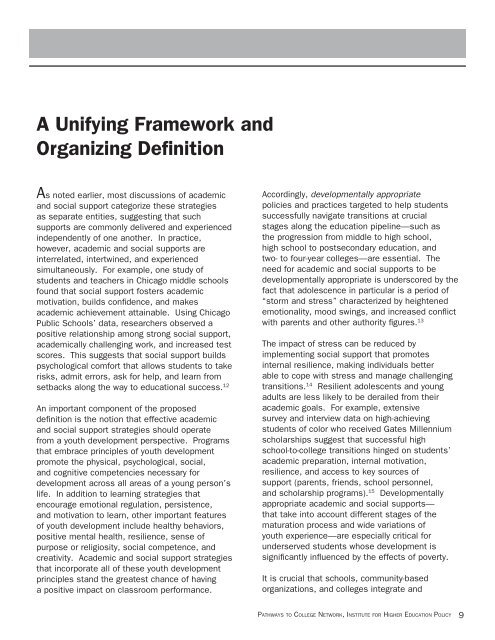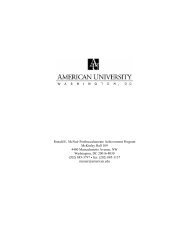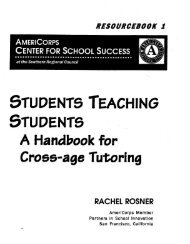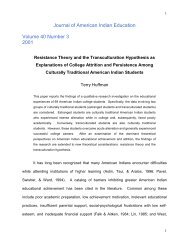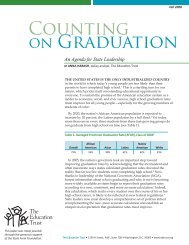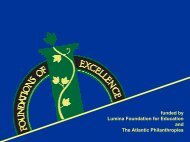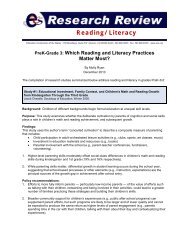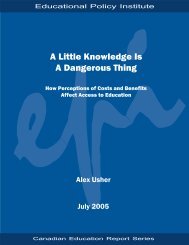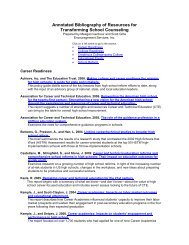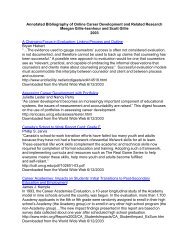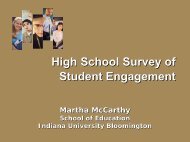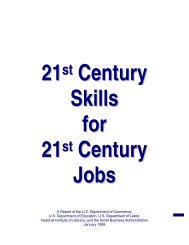Removing Roadblocks to Rigor: Linking Academic and Social ...
Removing Roadblocks to Rigor: Linking Academic and Social ...
Removing Roadblocks to Rigor: Linking Academic and Social ...
Create successful ePaper yourself
Turn your PDF publications into a flip-book with our unique Google optimized e-Paper software.
A Unifying Framework <strong>and</strong><br />
Organizing Definition<br />
As noted earlier, most discussions of academic<br />
<strong>and</strong> social support categorize these strategies<br />
as separate entities, suggesting that such<br />
supports are commonly delivered <strong>and</strong> experienced<br />
independently of one another. In practice,<br />
however, academic <strong>and</strong> social supports are<br />
interrelated, intertwined, <strong>and</strong> experienced<br />
simultaneously. For example, one study of<br />
students <strong>and</strong> teachers in Chicago middle schools<br />
found that social support fosters academic<br />
motivation, builds confidence, <strong>and</strong> makes<br />
academic achievement attainable. Using Chicago<br />
Public Schools’ data, researchers observed a<br />
positive relationship among strong social support,<br />
academically challenging work, <strong>and</strong> increased test<br />
scores. This suggests that social support builds<br />
psychological comfort that allows students <strong>to</strong> take<br />
risks, admit errors, ask for help, <strong>and</strong> learn from<br />
setbacks along the way <strong>to</strong> educational success. 12<br />
An important component of the proposed<br />
definition is the notion that effective academic<br />
<strong>and</strong> social support strategies should operate<br />
from a youth development perspective. Programs<br />
that embrace principles of youth development<br />
promote the physical, psychological, social,<br />
<strong>and</strong> cognitive competencies necessary for<br />
development across all areas of a young person’s<br />
life. In addition <strong>to</strong> learning strategies that<br />
encourage emotional regulation, persistence,<br />
<strong>and</strong> motivation <strong>to</strong> learn, other important features<br />
of youth development include healthy behaviors,<br />
positive mental health, resilience, sense of<br />
purpose or religiosity, social competence, <strong>and</strong><br />
creativity. <strong>Academic</strong> <strong>and</strong> social support strategies<br />
that incorporate all of these youth development<br />
principles st<strong>and</strong> the greatest chance of having<br />
a positive impact on classroom performance.<br />
Accordingly, developmentally appropriate<br />
policies <strong>and</strong> practices targeted <strong>to</strong> help students<br />
successfully navigate transitions at crucial<br />
stages along the education pipeline—such as<br />
the progression from middle <strong>to</strong> high school,<br />
high school <strong>to</strong> postsecondary education, <strong>and</strong><br />
two- <strong>to</strong> four-year colleges—are essential. The<br />
need for academic <strong>and</strong> social supports <strong>to</strong> be<br />
developmentally appropriate is underscored by the<br />
fact that adolescence in particular is a period of<br />
“s<strong>to</strong>rm <strong>and</strong> stress” characterized by heightened<br />
emotionality, mood swings, <strong>and</strong> increased conflict<br />
with parents <strong>and</strong> other authority figures. 13<br />
The impact of stress can be reduced by<br />
implementing social support that promotes<br />
internal resilience, making individuals better<br />
able <strong>to</strong> cope with stress <strong>and</strong> manage challenging<br />
transitions. 14 Resilient adolescents <strong>and</strong> young<br />
adults are less likely <strong>to</strong> be derailed from their<br />
academic goals. For example, extensive<br />
survey <strong>and</strong> interview data on high-achieving<br />
students of color who received Gates Millennium<br />
scholarships suggest that successful high<br />
school-<strong>to</strong>-college transitions hinged on students’<br />
academic preparation, internal motivation,<br />
resilience, <strong>and</strong> access <strong>to</strong> key sources of<br />
support (parents, friends, school personnel,<br />
<strong>and</strong> scholarship programs). 15 Developmentally<br />
appropriate academic <strong>and</strong> social supports—<br />
that take in<strong>to</strong> account different stages of the<br />
maturation process <strong>and</strong> wide variations of<br />
youth experience—are especially critical for<br />
underserved students whose development is<br />
significantly influenced by the effects of poverty.<br />
It is crucial that schools, community-based<br />
organizations, <strong>and</strong> colleges integrate <strong>and</strong><br />
PATHWAYS TO COLLEGE NETWORK, INSTITUTE FOR HIGHER EDUCATION POLICY 9


